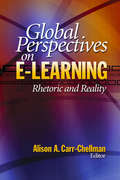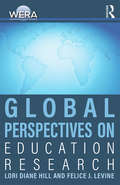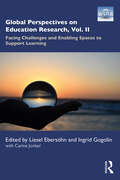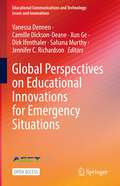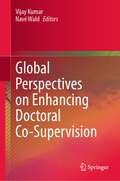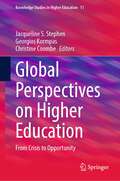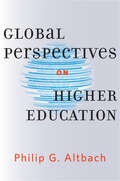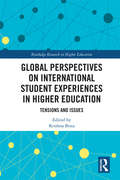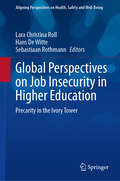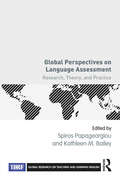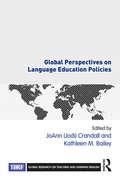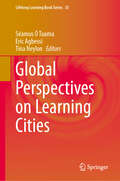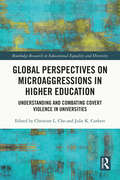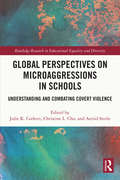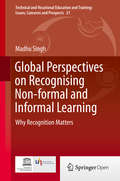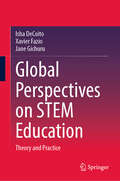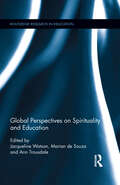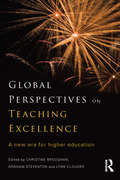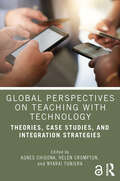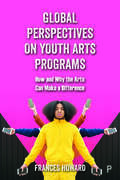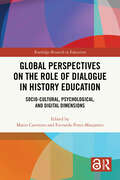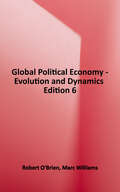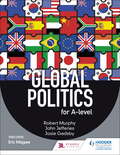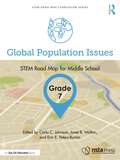- Table View
- List View
Global Perspectives on E-Learning: Rhetoric and Reality
by Alison A. Carr-ChellmanGlobal Perspectives on E-Learning: Rhetoric and Reality presents several cases of international online education and the rhetoric that surrounds this form of teaching and learning. Editor Alison A. Carr-Chellman examines the impact of online distance education throughout the world in an effort to understand more deeply the merits of such initiatives. Written from a critical perspective, the book sheds light on some of the problems faced by international distance educators. It particularly focuses on who benefits, and who does not, by the advance of international e-learning and how we can respond to the needs of the disenfranchised. This book is intended to supplement what has to this point been largely a positive, how-to literature in distance education. It offers a balanced perspective on the problems and possibilities of distance education worldwide.
Global Perspectives on Education Research
by Lori Diane Hill Felice J. LevineGlobal Perspectives on Education Research echoes the breadth and scope of education research worldwide. It features the work of established and emerging scholars from a range of universities and research institutions in Africa, Europe, and North America. The book’s ten chapters are organized around four themes: Education Policy, Teaching and Learning, School Context and Student Outcomes, and Assessment and Measurement. Each chapter offers cross-cultural, transnational, or comparative insights on some of the most pressing challenges and promising opportunities for improving education around the world. Across thematic areas, these perspectives shape new ways of understanding context as an influence on, and a framework for, conceptual insights into education policy and practice at the international, national, and local levels. With chapters on topics including the cultural complexities of literacy, the effect of socioeconomic inequality on student learning, and the tension between education for global competitiveness and education for global citizenship as national policy strategies, Global Perspectives on Education Research addresses issues and questions that will interest education researchers, educators, policy makers, and societal leaders worldwide. This volume is a publication of the World Education Research Association (WERA). WERA is an association of major national, regional, and international specialty research associations dedicated to advancing education research as a scientific and scholarly field. WERA undertakes initiatives that are global in nature and thus transcend what any one association can accomplish in its own country, region, or area of specialization.
Global Perspectives on Education Research, Vol. II: Facing Challenges and Enabling Spaces to Support Learning
by Liesel Ebersöhn Ingrid Gogolin Carine JonkerPresenting a wide range of new research from World Education Research Association (WERA)-affiliated scholars pertaining to democracy and education, this volume including topics such as school readiness in Mongolia, high-stakes teacher evaluation policy in Japan, and family and community involvement in global educational advocacy. This collection arrives at a time of extreme global challenges, leaving researchers, teachers, students, families and policymakers without a baseline of how to act, react and be proactive to stem the chronic flow of disruption to global education systems. These challenges require researchers worldwide to consider how evidence can support individuals and systems to buffer against extreme global health distress and conflict whilst simultaneously supporting the continued functioning of education systems and processes. Such processes must allow students, teachers, leaders, administrators and members of the educational communities to retain positive self-esteem and maintain supportive relationships and systems that provide the appropriate conditions for such processes. Global Perspectives on Education Research pulls together contributions from different contexts and cultures to distil vistas and research results that can enlighten a worldwide community of researchers, education professionals and practitioners, as well as policymakers and local, national or supra-national decision-makers. This text is also the ideal companion for educators and leaders alike as they navigate the uncertainty within global health and social justice.
Global Perspectives on Educational Innovations for Emergency Situations (Educational Communications and Technology: Issues and Innovations)
by Dirk Ifenthaler Xun Ge Vanessa Dennen Camille Dickson-Deane Sahana Murthy Jennifer C. RichardsonThis open access book focuses on making the transition from in-person, classroom education to other feasible alternative modes and methodologies to deliver education at all levels. The book presents and analyzes research questions to explore in this arena, including pedagogical issues relating to technological and infrastructure challenges, teacher professional development, issues of disparity, access and equity, and impact of government policies on education. It also provides unique opportunities and vehicles for generating scholarship that helps explain the varied educational needs, perspectives and solutions that arise during an emergency and the different roles educational institutions and educators may play during this time.Developed from a highly successful Presidential Session at the annual meeting of the Association for Educational Communications and Technology (AECT), this edited volume presents AECT and its membership as the premier organization focusing on the provision of educational communications and technology leadership. In addition, it functions as a contemporary document of this global crisis as well as a rich resource for possible future emergency scenarios in the educational arena.
Global Perspectives on Enhancing Doctoral Co-Supervision
by Vijay Kumar Navé WaldThis book examines the shift in doctoral co-supervision from traditional hierarchical approaches to team-based models. Authored by international experts in doctoral education, the 14 case studies critically assess co-supervision within distinct institutional and national contexts, and indicate shifts in doctoral education and the rise of co-supervision models. The case studies offer insights into national and institutional policies, mentoring programs, workload distribution, conflict mitigation, and the intricacies of co-supervision, including role management and power dynamics. The book also highlights challenges and proven good practices for academics who are considering or experiencing co-supervision.
Global Perspectives on Higher Education: From Crisis to Opportunity (Knowledge Studies in Higher Education #11)
by Christine Coombe Georgios Kormpas Jacqueline S. StephenThis edited volume explores the impact of recent events worldwide that commanded rapid transformation with the areas of teaching, learning, assessment, administration, and academic support systems in today’s higher education institutions globally. It draws on a range of theories and research to provide global perspectives on student and instructor-centered approaches, such as, teaching, learning, assessment, technology use, student and instructor success, curriculum and instructional design, professional development, and academic and administrative support systems. The chapters in this volume capture the personal experiences of educators, educational support professionals, and emerging teachers who encountered crises in the form of disruptions (i.e., COVID-19 pandemic), advancements (i.e., technology), and transformations (i.e., practices, procedures). Educators, administrators, and policymakers benefit by learning about the ways other institutions of higher education continue to adapt to address emerging gaps.The 33 chapters in this volume were authored by international researchers, practitioners, and experts from 20 countries. This diverse group of authors share their experiences in creating opportunities from challenges to address gaps in higher education exposed by disruptions from the external and internal environments.
Global Perspectives on Higher Education: Insights From Key Global Publications (Global Perspectives On Higher Education Ser. #36)
by Philip G. AltbachThe single best book on higher education as a global phenomenon.Over the past half-century, globalization has had a profound impact on postsecondary education. The twin forces of mass higher education and the global knowledge economy have driven an unprecedented transformation. These fundamental changes have pulled in opposite directions: one pushes for wider access and accompanying challenges of quality, the other toward exclusive, "world class" research-oriented universities. In Global Perspectives on Higher Education, renowned higher education scholar Philip G. Altbach offers a wide-ranging perspective on the implications of these key forces and explores how they influence academe everywhere. Altbach begins with a discussion of the global trends that increasingly affect higher education, including the implications of mass enrollments, the logic of mass higher education systems around the world, and specific challenges facing Brazil, Russia, India, and China. He considers the numerous implications of globalization, including the worldwide use of the English language, university cross-border initiatives, the role of research universities in developing countries, the impact of the West on Asian universities, and the expansion of private higher education.Provocative and wide-ranging, Global Perspectives on Higher Education considers how the international exchange of ideas, students, and scholars has fundamentally altered higher education.
Global Perspectives on International Student Experiences in Higher Education: Tensions and Issues (Routledge Research in Higher Education)
by Krishna BistaGlobal Perspectives on International Student Experiences in Higher Education examines a wide range of international student experiences empirically from multiple perspectives that includes socio-cultural identities, contextual influences on their learning experiences, their wellbeing experiences, and their post-study experiences. This collection sheds light on the over five million students who cross geographical, cultural, and educational borders for higher education outside of their home countries. This book consists of nineteen chapters spread across four sections. Throughout the book, contributors question the existing assumptions and values of international student programs and services, reexamine and explore new perspectives to present the emerging challenges and critical evaluations of student experiences and their identities. Offering a rich understanding of these students and their global college experiences in Africa, Asia, Australia, Europe and Americas, this book offers research-based strategies to effectively recruit, engage, support, and retain international students as they participate in higher educational settings around the world. This book provides resource material to benefit educators, policymakers, and staff who work closely with international students in higher education.
Global Perspectives on Job Insecurity in Higher Education: Precarity in the Ivory Tower (Aligning Perspectives on Health, Safety and Well-Being)
by Sebastiaan Rothmann Hans De Witte Lara Christina RollThis compelling book delves into the damaging effects of job insecurity in higher education across ten countries, shedding light on its profound implications for individuals and institutions. By exploring the associations between job insecurity and critical factors such as health, well-being, and performance, it underscores the urgent need for effective intervention measures. The book also highlights the ripple effects of job insecurity on academic staff, researchers, PhD and postdoctoral students as well as administrative and support staff, ultimately impacting the quality of education. Featuring the largest cross-country data collection on this topic to date, this collaborative effort brings together leading international researchers to provide novel insights. Each chapter offers unique comparative analyses, making the book a vital resource for academics, policymakers, students, and readers worldwide who are invested in the future of higher education. It is both a call to action and a foundation for further research in this critical area.
Global Perspectives on Language Assessment: Research, Theory, and Practice (Global Research on Teaching and Learning English)
by Kathleen M. Bailey Spiros PapageorgiouThe sixth volume in the Global Research on Teaching and Learning English series offers up-to-date research on the rapidly changing field of language assessment. The book features original research with chapters reporting on a variety of international education settings from a range of diverse perspectives. Covering a broad range of key topics—including scoring processes, test development, and student and teacher perspectives—contributors offer a comprehensive overview of the landscape of language assessment and discuss the consequences and impact for learners, teachers, learning programs, and society. Focusing on the assessment of language proficiency, this volume provides an original compendium of cutting-edge research that will benefit TESOL and TEFL students, language assessment scholars, and language teachers.
Global Perspectives on Language Education Policies (Global Research on Teaching and Learning English)
by Kathleen M. Bailey JoAnn Jodi CrandallPresenting research on language policy and planning, with a special focus on educational contexts in which English plays a role, this book brings readers up-to-date on the latest developments in research, theory, and practice in a rapidly changing field. The diversity of authors, research settings, and related topics offers a sample of empirical studies across multiple language teaching and university contexts. The fifth volume in the Global Research on Teaching and Learning English series, it features access to both new and previously unpublished research in chapters written by TIRF Doctoral Dissertation Grant awardees and invited chapters by respected scholars in the field.
Global Perspectives on Learning Cities (Lifelong Learning Book Series #35)
by Séamus Ó Tuama Eric Agbessi Tina NeylonThis book examines the social, political and economic rationales, which lead to the development of learning cities in diverse settings in Africa, Australia, Asia and Europe. Many of the contributors are practitioners who have played an active part in the development of their learning city. Some contributors are both practitioners and researchers on learning cities. Some are primarily researchers who are focused on understanding learning cities, gauging the benefits and potential of learning cities and formulating new theories and approaches. The book also includes interviews with and contributions from key founding figures in the learning cities movement and in the development of UNESCO&’s Global Network of Learning Cities. The book explores diverse initiatives that are shaping the lives of people in cities today and into the future, fostering inclusivity, sustainability, and resilience. Each chapter offers a unique perspective on the transformative power of lifelong learning and collective commitment. Contributors share their insights, from grassroots to high level policy discussions, shedding light on the challenges and triumphs encountered along the way. This is the first major book looking at learning cities across the globe from both theoretical and practical perspectives. What sets it apart is the diversity in the material offered and the geographical and cultural spread of contexts. Cities are becoming ever more important to the future of humanity, learning cities are a vast laboratory of new and innovative ways in which people can learn together to create more fulfilling lives, better opportunities and put into practice on a daily basis the four principles outlined in the Delors Report (1996): Learning to know, Learning to do, Learning to live together, Learning to be. This book is a valuable resource for policymakers, educators, and community leaders striving to build more inclusive and sustainable societies. Whether embarking on the journey of developing a learning city or seeking inspiration from successful initiatives, readers will find practical insights and thought-provoking perspectives within these pages.
Global Perspectives on Microaggressions in Higher Education: Understanding and Combating Covert Violence in Universities (Routledge Research in Educational Equality and Diversity)
by Christine L. ChoThis book recognizes microaggression as a pervasive issue in colleges and universities around the world and offers critical analyses of the local and institutional contexts in which such incidences of violence and discrimination occur. Authors from Egypt, Barbados, South Africa, Canada, and the United States explore the origins and forms of microaggression which impact students, faculty, and staff in higher education and address issues including xenophobia, sexual violence, linguistic discrimination, and racial prejudice. Drawing on a range of theoretical frameworks and utilizing empirical, qualitative, and ethnographic methods to consider microaggressions perpetrated by both students and staff, each chapter proposes practical ways to prevent violence through education, student agency, policy, and leadership. This book offers a contemporary global dialogue with educators and is vital reading for educators and administrators in higher education.
Global Perspectives on Microaggressions in Schools: Understanding and Combating Covert Violence (Routledge Research in Educational Equality and Diversity)
by Christine L. Cho Julie K. Corkett Astrid SteeleRecognizing microaggression as an often unseen, yet pervasive issue in schools globally, this book offers critical examination of instances of aggression, hostility, and incivility in school contexts around the world. Drawing on authors’ experiences and empirical analyses, the volume puts forward practical recommendations to remedy such violence and tackle its root causes. Global Perspectives on Microaggressions in Schools brings together contributions from South Africa, Australia, Canada, and the US to explore the various forms that microaggression can take. Authors implement qualitative methodologies, personal reflection, and empirical literature to document microaggressions perpetrated by, and directed against all members of the school community, including students, teachers, school leaders, and administrators. In doing so, they highlight ongoing issues including xenophobia, sexual violence, and prejudice against gifted students, LGBTQ, refugee, and indigenous communities. Looking forward, the volume proposes practical ways to undermine such prejudices and prevent the occurrence of microaggressions through effective training, policy, leadership, and student agency. Given its rigorous approach and attention to widespread issues of school violence, this book will be a timely resource for scholars, researchers, and academics with an interest in the sociology of education, educational leadership, school culture, student well-being, and inclusive education. In addition, school leaders, administrators, and pre- and in-service educators may find benefit from reading this volume.
Global Perspectives on Recognising Non-formal and Informal Learning
by Madhu SinghThis book deals with the relevance of recognition and validation of non-formal and informal learning education and training, the workplace and society. In an increasing number of countries, it is at the top of the policy and research agenda ranking among the possible ways to redress the glaring lack of relevant academic and vocational qualifications and to promote the development of competences and certification procedures which recognise different types of learning, including formal, non-formal and informal learning. The aim of the book is therefore to present and share experience, expertise and lessons in such a way that enables its effective and immediate use across the full spectrum of country contexts, whether in the developing or developed world. It examines the importance of meeting institutional and political requirements that give genuine value to the recognition of non-formal and informal learning; it shows why recognition is important and clarifies its usefulness and the role it serves in education, working life and voluntary work; it emphasises the importance of the coordination, interests, motivations, trust and acceptance by all stakeholders. The volume is also premised on an understanding of a learning society, in which all social and cultural groups, irrespective of gender, race, social class, ethnicity, mental health difficulties are entitled to quality learning throughout their lives. Overall the thrust is to see the importance of recognising non-formal and informal learning as part of the larger movement for re-directing education and training for change. This change is one that builds on an equitable society and economy and on sustainable development principles and values such as respect for others, respect for difference and diversity, exploration and dialogue.
Global Perspectives on STEM Education: Theory and Practice
by Isha DeCoito Xavier Fazio Jane GichuruThis book focuses on STEM education as it applies to global competencies, innovative curriculum and accompanying pedagogy. Through a thematic approach, the authors explore cross-cutting perspectives, with a focus on social, equitable, environmental, and scientific issues as they relate to STEM literacy. The research outlined in the book adopts an integrated STEM framework that assesses, analyzes and explicitly links all STEM disciplines. The book prepares and inspires both educators and students to participate in STEM on a global level. The research presented in the book highlights innovative and unique classroom practices in STEM education (e.g., STEM environmental projects, digital video games). The book links research on and in practice, and the intended audience include STEM educators, researchers, curriculum developers, and policymakers interested in innovative STEM education.
Global Perspectives on Spirituality and Education: Global Perspectives On Spirituality And Education (Routledge Research in Education)
by Marian De Souza Jacqueline Watson Ann TrousdaleIn recent decades, and around the world, much attention has been given to the role of spirituality in the education of children and young people. While educationalists share many common goals and values in nurturing the spiritual lives of children and young people, national and regional cultures, religions and politics have impacted on the approaches scholars and practitioners have adopted in their investigations and practices. The different contexts across nations and regions mean that educators face quite distinct conditions in which to frame their approaches to spiritual education and research, and the nature and impact of these differences is not yet understood. This book brings together thinkers from around the globe and sets them the task of explaining how their research on children’s spirituality and education has been shaped by the historical, cultural, religious and political contexts of the geographic region in which they work. The book presents contributions in three sections – Europe and Israel, Australasia, and The Americas– and concludes with a chapter highlighting what is common and what is contextually unique about global approaches to spirituality and education.
Global Perspectives on Teaching Excellence: A new era for higher education
by Graham Steventon Lynn Clouder Christine BroughanTeaching excellence in higher education needs to be promoted and celebrated. However, a universal definition of excellent teaching remains elusive, and robust evidence about how it affects student learning appears to be lacking. This timely book explores the notion of teaching excellence from the viewpoint of a variety of international authors; guiding the reader to understand the complex terrain in which teaching excellence is foregrounded, and highlighting a number of key issues facing the future of global higher education. Global Perspectives on Teaching Excellence explores: what is meant by teaching excellence, whether it can be measured and if so, how? the impact of teaching excellence frameworks, initiatives and awards. the new challenges for delivering global teaching excellence fit for the 21st century. With a mix of political, theoretical and applied research foci, each chapter also includes a short critical commentary from international experts in the field to further the debate and situate the topics in a wider context. Global Perspectives on Teaching Excellence is essential reading for academic and education policymakers, researchers, and undergraduate and postgraduate students in education.
Global Perspectives on Teaching with Technology: Theories, Case Studies, and Integration Strategies
by Helen Crompton Agnes Chigona Nyarai TunjeraGlobal Perspectives on Teaching with Technology presents a wealth of current research on how teacher education and training programs around the world are preparing teachers to integrate and apply learning technologies across subjects, grade levels, and regions. Digital tools are more integral than ever to an accessible and well-rounded education, although their rapid evolution and proliferation necessitate new guidance into their effective integration and intended outcomes. This book provides graduate students, faculty, and researchers of teacher education, as well as trainers of in-service teachers with field-tested frameworks, evidence-based theories and models, and real-world examples of the complexities and affordances of teaching with technology. Internationally sourced to reflect today's richly diverse and globalized learner populations, the case studies collected here offer fresh approaches for teacher educators and a springboard for education researchers studying how practitioners can thrive in their classrooms and foster equity among students.Chapter 16 of this book is freely available as a downloadable Open Access PDF at http://www.taylorfrancis.com under a Creative Commons Attribution-Non Commercial-No Derivatives (CC-BY-NC-ND) 4.0 license.
Global Perspectives on Youth Arts Programs: How and Why the Arts Can Make a Difference
by Frances HowardHow do young people develop through youth arts programs and how can these programs reflect and extend young people’s personal interests? How can youth arts support participatory democracy and social change? Frances Howard puts forward a powerful case for the value of youth arts programs, whilst acknowledging and interrogating the complexities involved, including unequal access to provision and the class-based harm that can be inadvertently practiced within them. Drawing on the author's own practice experience, alongside a range of international case studies showing best practice, this grounded and accessible text will be welcome reading to academics, students and practitioners across Education, Youth and Community courses.
Global Perspectives on the Role of Dialogue in History Education: Socio-cultural, Psychological, and Digital Dimensions (Routledge Research in Education)
by Mario Carretero Everardo Perez-ManjarrezProviding the first volume-length exploration of the role that dialogue can play in history education classrooms, this book explores the socio-cultural, psychological, and digital dimensions of dialogic practice to promote research into historical thinking, historical consciousness, and critical thinking in educational settings.This book’s novel approach is in its analysis of dialogical processes in various international and intercultural educational contexts; chapters compare Israeli and Palestinian textbooks and classroom discussion and explore teachers’ challenges to shift monologic school culture, as well as approaches to enhancing dialogic practices both in US contexts and in several EU countries. Each case study provides an insight into the nature of dialogue as both shared historical inquiry and cultural practice. How can dialogue be promoted, and through what mechanisms? In what ways can dialogue contribute to democratic societies’ thriving and dealing with and overcoming conflicts about different views on the past? Ultimately, the book looks to foster a nuanced and complex understanding of history, prompting consideration of different perspectives and a collective approach to overcoming troubled pasts and trauma.Featuring a truly international set of contributions from established and emerging scholars, this book will appeal to scholars, researchers, and postgraduate students interested in the history of education, education policy and politics, and historiography more broadly. This book was made possible with the support of the EU project www.making-histories.eu (10108606), coordinated by the first author.
Global Political Economy: Evolution and Dynamics, 6th ed
by Robert O'Brien Marc WilliamsOffering an accessible introduction to both the historical roots and the contemporary dynamics of today’s world economy, the extensively revised sixth edition of this bestselling textbook continues to lead the way in equipping students with the knowledge required to make sense of the fast-paced discipline of Global Political Economy. Illustrating the breadth of the subject, the book’s authors – both highly regarded experts in the field – show how the national and international interact, while also placing an emphasis on the historical evolution of the world economy in order to appreciate the nuances of today’s economic structures. The global economy is traced from the Industrial Revolution through each phase of a shifting world order to the modern day. Then follows an engaging exploration of the dynamics of today’s economy, including trade, production, finance, labour, gender, development, the environment, security and governance. This takes into account the latest developments in the global economy, from automation and the challenges posed to the labour force to artificial intelligence and the increasingly complex global supply chains of modern transnational firms. This is the most authoritative and accessible textbook on global political economy, making it the ideal companion for students at undergraduate and postgraduate levels, on Politics, International Relations and related degrees.
Global Politics for A-level
by Robert Murphy John Jefferies Josie GadsbyExpand your students' political thinking and put global politics into context with this brand new textbook; created for the 2017 politics specifications. Combining up-to date commentary and analysis with case studies and features, this textbook will help develop an understanding of politics from the local to the international, revealing how political issues affect us all.- Comprehensive coverage of the latest developments in global politics - Analysis of the perspectives of liberalism and realism- Definitions of key terms and concepts to help clarify knowledge and understanding of political language- Exam focus sections at the end of each chapter to test and develop understanding of key topics, offering practice for short and essay questions
Global Politics for A-level
by Robert Murphy John Jefferies Josie GadsbyExpand your students' political thinking and put global politics into context with this brand new textbook; created for the 2017 politics specifications. Combining up-to date commentary and analysis with case studies and features, this textbook will help develop an understanding of politics from the local to the international, revealing how political issues affect us all.- Comprehensive coverage of the latest developments in global politics - Analysis of the perspectives of liberalism and realism- Definitions of key terms and concepts to help clarify knowledge and understanding of political language- Exam focus sections at the end of each chapter to test and develop understanding of key topics, offering practice for short and essay questions
Global Population Issues, Grade 7: STEM Road Map for Middle School (STEM Road Map Curriculum Series)
by Carla C. Johnson Erin E. Peters-Burton Janet B. WaltonWhat if you could challenge your seventh-grade students to explore mathematical principles as well as global population issues as they consider population density? With this volume in the STEM Road Map Curriculum Series, you can! Global Population Issues outlines a journey that will steer your students toward authentic problem solving while grounding them in integrated STEM disciplines. Like the other volumes in the series, this book is designed to meet the growing need to infuse real-world learning into K–12 classrooms. This interdisciplinary, four-lesson module uses project- and problem-based learning to help students to devise a model for counting populations of a given species on Earth and develop a formal presentation of their models for consideration by a panel of experts. Students will examine species’ ecosystems, explore global populations with an economic and geographical lens, take on the role of an urban planner to develop a megacity that incorporates what they have researched and learned about the consequences of population density and overpopulation, and share literature relevant to their applied species model. To support this goal, students will do the following: · Explore how to gather information about a population and make valid generalizations and inferences from this information · Utilize mathematical practices to complete mathematical explorations · Explore the impact of population density on humans and the environment · Communicate learning and experiences about population density and its influence on humans and the environment through various forms of writing, speaking, and analyzing non-fiction text · Explore the historical, social, geographical, and economic factors related to population density The STEM Road Map Curriculum Series is anchored in the Next Generation Science Standards, the Common Core State Standards, and the Framework for 21st Century Learning. In-depth and flexible, Global Population Issues can be used as a whole unit or in part to meet the needs of districts, schools, and teachers who are charting a course toward an integrated STEM approach.
